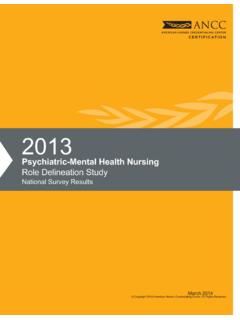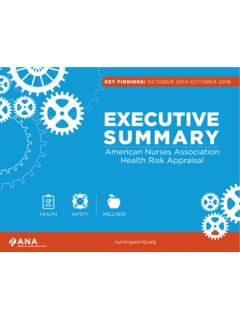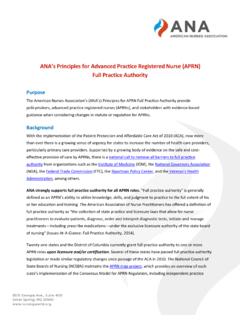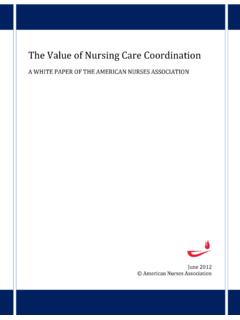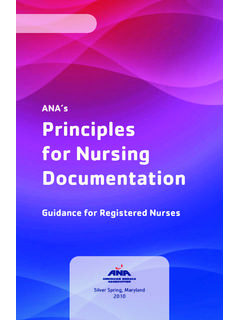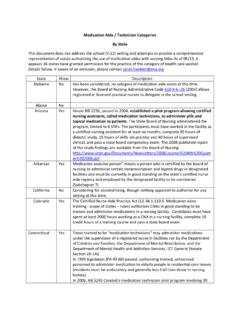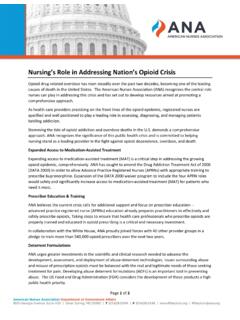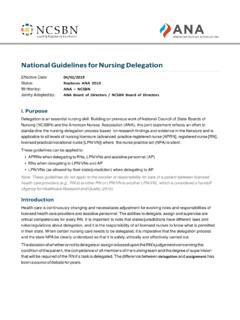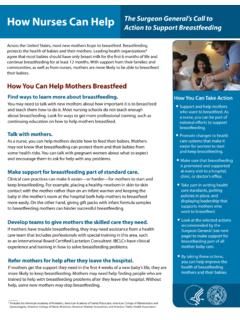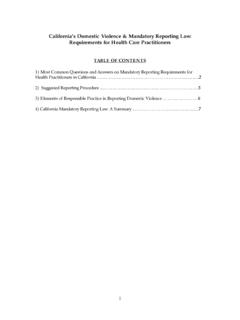Transcription of Nurses role in providing ethically and developmentally ...
1 8515 Georgia Avenue, Suite 400 Silver Spring, MD 20910 nurse s Role in providing ethically and developmentally Appropriate Care to People With Intellectual and Developmental Disabilities Effective Date: 2019 Status: Revised Position Statement Written by: ANA Center for Ethics and Human Rights Adopted by: ANA Board of Directors Purpose The purpose of this position statement is to identify issues in the provision of ethically and developmentally appropriate care to people with intellectual and developmental disabilities (IDD).1 Because of cognitive, physical, and communication challenges often faced by people with IDD, Nurses must be sensitive to needs across the lifespan and in all settings. This position statement is written for novice Nurses with little to no experience with people with IDD, and for expert Nurses who have vast knowledge and experience with this population. Its intent is to support people with IDD, by respecting and understanding differences and enabling them to realize their full potential in health situations while building on existing strengths and skills as active, engaged citizens, so that others can benefit from their talents and abilities.
2 Statement of ANA Position The American Nurses Association (ANA) believes that Nurses must provide compassionate, comprehensive, and person-centered care to all people, inclusive of at-risk populations such as people with IDD who experience health disparities across practice settings. The nurse s primary commitment is to the patient, whether an individual, family, group, community, or population (ANA, 2015, ). By virtue of their disability, people with IDD often require support across the lifespan, which encompasses support for the individual, family, caregiver, and community. Nursing care for people with IDD should focus on individual 1 Limitations in both intellectual functioning and adaptive behavior, which includes many everyday social and practical skills, are characteristic of intellectual disability. Intellectual disability originates before the age of 18. The most common syndromes associated with intellectual disability are Down syndrome, Fragile X syndrome and fetal alcohol spectrum disorder (FASD).
3 Intellectual disability also co-occurs in nearly a third of people with autism spectrum disorder. 8515 Georgia Avenue, Suite 400 Silver Spring, MD 20910 Page | 2 nurse s Role in providing ethically & developmentally Appropriate Care to People with IDD needs and strengths, rather than a diagnosis or label. Nurses are well positioned to advocate for the rights of people with IDD, as well as protect them from potentially harmful factors, such as victimization, abuse, neglect, and discrimination. Nurses should be aware that a restricted view of advocacy, focusing exclusively on either progress or challenges, may fail to address the spectrum of needs faced by people with IDD. Nurses can enhance the quality of life for people with IDD through advocacy efforts to break down traditional barriers, bias, stigmas, and stereotypes. Nursing care should focus on providing opportunities for people with IDD to participate in activities that promote self-determination and enhance quality of life.
4 Nurses must provide care that enables people with complex care needs and difficulty with cognitive functioning to live fully with as much physical, emotional, social, and spiritual well-being as possible. History/previous policy: 1982 National Year of Disabled Persons (ANA, 1982). 1983-1992 as the Decade of Disabled Persons (ANA, 1984). 1998 Scope and Standards for the nurse Who Specializes in Developmental Disabilities and/or Mental Retardation (ANA, 1998). 2004 Intellectual and Developmental Disabilities Nursing: Scope and Standards of Practice (ANA, 2004). 2013 Intellectual and Developmental Disabilities Nursing: Scope and Standards of Practice (ANA, 2013). Nursing Advocacy and Ethical Challenges in Decision Making People with IDD experience a myriad of disparities related to health care and access to health care. It is not within the scope of this position to detail each of these.
5 However, Nurses must have knowledge and awareness of the potential for inequity in people with intellectual and developmental disabilities (IDD). Although considerable progress has been made in the past fifty years, people with IDD still experience life expectancies approximately twenty years lower than the general population (Lauer & McCallion, 2015). While potentially influenced by factors associated with IDD, this inequity is exacerbated by modifiable determinants such as access to care, poverty, communication deficits, and self-advocacy challenges (Anderson et al., 2013). Emerging research also indicates that adults with IDD from ethnic and racial minorities have poorer health outcomes when compared to White adults with IDD (Mangana et al., 2016). This inequality in morbidity among people with IDD exists even if they are supported by state IDD service systems (Lauer & McCallion, 2015). In addition to disparities of physical health, people with IDD also experience disparities of mental health.
6 Mental health disorders are more prevalent among adults with IDD but are often undiagnosed or attributed to symptoms of IDD (Son, Debono, Leitner, Lenroot, & Johnson, 2018). This diagnostic overshadowing frequently occurs in people with IDD and therefore their mental health disorders are left untreated (Son, Debono, Leitner, Lenroot, & Johnson, 2018; Sutton & Gates, 2018). Access to mental health services for people with IDD is an additional complication due to poor utilization of service availability at both systemic and personal levels (Whittle, Fisher, Reppermund, & Trollor, 2018). It is critical for Nurses to establish effective communication, adequate mental health screening, and collaboration with multidisciplinary professionals to identify barriers to person-centered mental health care for people with IDD (Whittle et al., 2018). 8515 Georgia Avenue, Suite 400 Silver Spring, MD 20910 Page | 3 nurse s Role in providing ethically & developmentally Appropriate Care to People with IDD Self-Determination Nurses must recognize that the presence of a disability does not automatically disqualify a person from participating in all decisions related to their care.
7 Nurses need to be aware of the ethical and legal considerations related to self-determination for those with IDD. Balancing protection of at-risk people and respecting individual preferences requires Nurses to have an understanding of the legal concepts related to informed consent, competency, capacity, guardianship, and guardianship alternatives. Ethical obligations emphasized in the Code of Ethics for Nurses with Interpretive Statements (The Code) include respect for human dignity requires the recognition of specific patient rights, in particular, the right to self-determination (ANA, 2015, p. 2). Encouraging self-determination for people with IDD can improve their quality of life, acknowledges their capabilities, and demonstrates professional respect for autonomy (Kerr & Linehan, 2015). Decision-making capacity is the ability to understand and appreciate the nature and consequences of health decisions and to formulate and communicate decisions concerning health care (Veterans Health Administration, 2002, p.)
8 2). Self-determination for people with IDD includes participation in decision making, unless a determination of incapacity has been made. When a patient lacks the capacity to make a decision about treatment, substitute decision makers are sought to strike a balance between respecting the autonomy of patients and protecting those with cognitive impairments (Appelbaum, 2007). Surrogate decision making is not without challenges, such as reluctance to make critical treatment decisions for others and the possibility that surrogates do not match patient preferences. Notwithstanding these issues, surrogates must impart the purest form of autonomy and respect for a patient s self-determination. It is important to acknowledge that an assessment of capacity should be done on a frequent basis. Depending on the permanency of the condition, medications, or mental status changes, capacity may wax and wane (Jonsen, 2010).
9 Having an intellectual or developmental disability does not automatically mean the person lacks capacity or requires guardianship. With proper support, some people with IDD can be active participants in their own health care decisions. For example, supported decision making, unlike guardianship, is a process by which a third party helps a person with IDD make legally enforceable decisions (Kohn & Blumenthal, 2014). Proponents of supported decision making hold that it promotes autonomy, dignity, and self-determination (Kohn & Blumenthal, 2014). Supported decision making is most effective when the support person knows about the person s disability and condition, is actively involved in the person s life, and will make a decision in the best interest of the patient (ANA, 2012; Informed Consent in Adults with IDD , ). Laws regarding supported decision making as well as various levels of guardianship vary widely among states.
10 Nurses must be aware of and knowledgeable about the relevant laws in their state of practice. A comprehensive list of guardianship and supported decision-making laws by state is available in the reference section below. It is important for the nurse to be cognizant of an IDD patient s reproductive rights and access to family planning care. Nursing education regarding sexual behavior, contraception, and pregnancy should be openly discussed with the person with IDD and the family. Considerations for minors and people with IDD under the care of others must be acknowledged in an individualized and developmentally appropriate manner. People with IDD often face barriers to contraception, preconception counseling, and pregnancy due to disapproval of family members or caregivers (Fouquier et al., 2015). A parent or caregiver may object to sex education, rationalizing that the prevention of information may dissuade the person with IDD from sexual activity (Fouquier et al.)
